Here There Are Blueberries
Moisés Kaufman & Amanda Gronich
Berkeley Repertory Theatre (A Tectonic Theater Project)
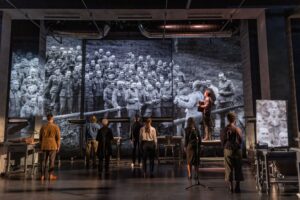
In 2007, an unnamed former U.S. Army officer donated a 32-page album with 116 black-and-white photos to the United States Holocaust Memorial Museum — an album he had found over sixty years prior in 1946 in an abandoned apartment in Germany. The album contained pictures of people singing, decorating Christmas trees, relaxing at a forested resort, and happily eating blueberries. But it soon became evident to museum archivist Rebecca Erbelding that these photos were of the most notorious of Nazi criminals including Auschwitz commander Rudolph Höss and the Angel of Death himself, Josef Mengele. The photos were of them, other officers, guards, and the clerical women who worked with them all enjoying their everyday lives. Missing were any photos of the nearby hundreds of thousands of Hungarian prisoners who were being put to horrific deaths during the June – December 1944 period when the photos were taken.
Whose album was it? What was the purpose of the album? Who are all the faces? What should a museum devoted only to the victims do with such a set of pictures of the perpetrators — history’s worst-ever monsters that by its own charter the museum did not want ever to portray as normal people.
Finding the answers to these and many likened questions becomes a gripping, thought-provoking, soul-searching docudrama now on tour at Berkeley Repertory Company. Here There Are Blueberries was created by Tony and Emmy nominated director, playwright, and filmmaker Moisés Kaufman and by equally acclaimed Emmy nominated and Pulitzer Prize finalist Amanda Gronich — both a part of the Tectonic Theater Project, creators of Gross Indecency: The Three Trials of Oscar Wilde, The Laramie Project, and I Am My Own Wife. Like their other wildly successful and much-produced plays, Here There Are Blueberries is both a journalistic and a theatrical masterpiece, a true-life work based on intensive interviews by the play’s creators of the play’s main characters, members of the Holocaust Museum’s staff who we witness as the dogged investigators probing the photographs’ and their occupiers’ histories.
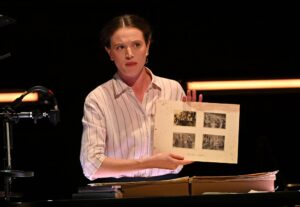
Della Cunningham is stunning in her role as the meticulous and methodical Rebecca Erbelding, a junior archivist who is convinced if the Holocaust Museum’s purpose is to “translate experience into knowledge,” there is much to be learned from an album that “is asking something of me.” Even though she meets early resistance to explore further the pictures of Nazis going about daily routines as if they had never done anything wrong, she becomes convinced that the Holocaust Museum must be the home for this collection because “it is the last place the Nazis would have wanted it to be.” As she uncovers like a skilled detective more and more clues of the occupants and the circumstances of the photographs, Della Cunningham’s Rebecca remarkably maintains a calm, dispassionate demeanor and a drive and determination for truth-finding that makes our watching her process totally captivating and almost breath-taking.
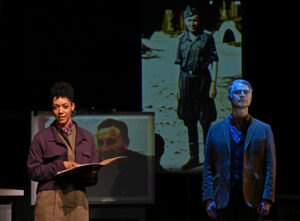
As imaginatively and boldly conceived and directed by Moisés Kaufman, Here There Are Blueberries is an album that literally comes to life page by page as Rebecca and her colleague, Judy Cohen (Barbara Pitts) work in the museum’s basement offices (Derek McLane, scenic designer). As they and others pore over each page, giant photographs splash across the Berkeley stage, with lit focus often placed on one highlighted individual, on a wedding ring, or on a bowl of blueberries — those close-ups projected on a large canvases held by a passing researcher (David Bengali, projection designer). And as we look at these pictures and hear the information being gleaned from them by the researchers, often the subjects themselves — an accordion-player, a Nazi officer, a female office worker — are in the spot light as if scooped out of the projected picture both to reenact their part of the scene or to tell in their words who they are and what they are doing. The effect is spine-chilling and unnerving. These people we want to see as devils are in life forms like people we might see in our own neighborhoods.
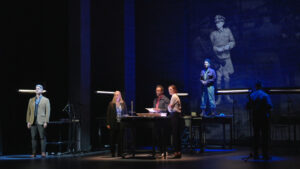
Ceesay
That is especially true given the inspired casting by the casting director, Stephanie Yankwitt. Each of the eight-person cast plays a primary and a number of secondary roles (both modern-day and those connected to Auschwitz). However, these people before us are not the Aryan role models Hitler and the Nazis wanted to populate their 1000-year realm-in-the-making. This cast is of mixed nationalities and races, people that look like all of us in the Berkeley audience.
It does not take long for Rebecca Erbelding and the museum team’s bottomline conclusion to hit home: “We have to look for ourselves in every picture.” These perpetrators — even the most notorious of the leaders among them — were originally an accountant, a bank teller, a cake confectioner. And at the center of all the horrific experiments and death-producing methods were the most trusted members of society — the doctors.
Watching this cast playing the roles of everyday people who clearly had to know exactly what was happening even as most later denied knowing anything of the deathly atrocities, we are left with Rebecca’s own question of herself: “What would I have done? Where would I be in the picture?” Would we have also continued our small piece of sub-divided work — a telegraph operator sending daily arrival totals to Berlin, a guard making sure no one escapes, a doctor deciding who looked healthy enough to work and who did not — while ignoring the smoke and the smell all around us? Time and again, we cannot help but squirm in our seats as we see this excellent, diverse cast that look just like us take on the voices and the persona of those jovial-looking, relaxing, playful (but very white and Germanic) people in those giant, black-and-white photos.

Rebecca does discover quite early on who was carefully and even proudly piecing together this scrapbook of sorts, and it becomes chillingly clear to her that Karl-Friedrich Höchs — Administrative Assistant to Rudolph Höss — was creating a legacy he hoped to hand one day to his grandchildren. Scott Barrow is shockingly and cooly confident, well-spoken, and strikingly handsome as the young family man Höchs. It seems that he just steps out onto the the stage from one of the many pictures Höchs included of himself in his prized scrapbook.
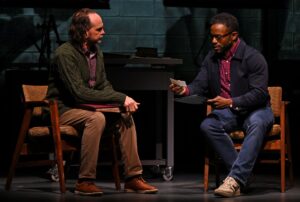
An international press release of the photos leads to the play’s recounting of some of the more amazing and uplifting results of the museum staff’s work. Luke Forbes is powerfully striking as a Black actor playing businessman Tilman Taube who from his home in Germany sees his grandfather in one of the photos. We watch as he takes on the task of finding other descendants of the photo’s subjects to learn their stories and their reactions to their own grandparents’ roles at Auschwitz.
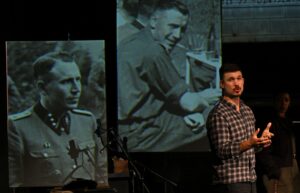
His pursuit and subsequent interviews are a fascinating part of the play’s unfolding, especially when he comes across Rainer Höss, the grandson of Auschwitz’s master builder and commander. Marrick Smith’s emotional accounting of his coming to grips how he deals with the guilt passed to him through two generations is one of the most riveting and memorable few minutes of the play’s quickly passing ninety.
But perhaps nothing can compare to the pictures of a second album found by Holocaust survivor Lily Jacobs, in a deserted Auschwitz barracks soon after the camp was liberated by the Russians. Kaufman and Gronich’s decision to conclude their docudrama with her story as one of the few Hungarian Jews who survived Auschwitz and to show photos of the album she found to compare to those of the Nazi officer’s scrapbook ensures that Here There Are Blueberries will forever be an evening of live theatre none of us in the audience will ever forget. Berkeley Repertory Company has once again brought to its stage a must-see production — one that challenges its audience to look at ourselves in the mirror and to ask ourselves, “Where are we today passively complicit with too clear of conscience?” In other words, “Where are we in these pictures?”
Rating: 5 E, MUST-SEE
A Theatre Eddys Best Bet Production
Here There Are Blueberries continues through May 11, 2025, in a ninety-minute, Tectonic Theatre Projects production staged by Berkeley Repertory Theatre in the Roda Theatre, 2015 Addison Street, Berkeley, California. Tickets are available online at https://www.berkeleyrep.org/ or by calling the Box Office Tuesday – Sunday, noon – 7 p.m. at 510-647-2949.
Photo Credits: Courtesy of McCarter Theatre Center

Leave a Reply